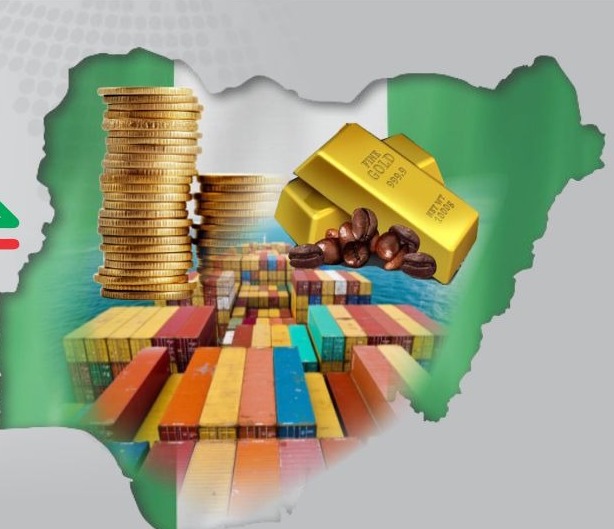By Merit Ibe
For decades, Nigeria’s economy has relied heavily on the export of unprocessed natural resources, including crude oil, raw cocoa, cashew nuts and solid minerals. While these sectors contribute to national revenue, they yield a fraction of the economic potential that processed goods could generate. For instance, while raw cocoa fetches relatively low prices in international markets, processed chocolate and cocoa products command significantly higher margins, profits that currently go to importing nations.
To this end, experts are calling for a strategic shift to value-added exports, especially as Nigeria grapples with sluggish economic growth and dwindling foreign exchange earnings.
This, they said, can unlock new revenue streams and stimulate industrialisation.
They added that transitioning to value-added exports is not just a choice but a necessity for sustainable growth.
They argue that by investing in local processing and manufacturing, Nigeria can significantly boost its export value, create jobs, reduce dependency on imports, and position itself more competitively in global markets, laying the foundation for long-term economic resilience.
This position was amplified recently by the President and Chief Executive Officer of African Development Bank (AfDB), Dr Akinwumi Adesina.
According to him, the continent’s continued dependence on unprocessed commodity exports remains a key driver of poverty and underdevelopment.
In a message shared via his official X (formerly Twitter) handle, Adesina emphasised the urgent need for Nigeria and Africa as a whole to morph from being a supplier of raw goods to a producer of value-added products that can drive wealth creation and economic transformation.
“Africa must end the exports of its raw materials. The export of raw materials is the door to poverty. The export of value-added products is the highway to wealth. And Africa is tired of being poor,” he declared.
Despite being richly endowed with natural resources, including crude oil, gold, cobalt, cocoa, coffee, and cotton, Africa continues to derive minimal economic benefit from its wealth due to the dominance of raw exports. These commodities are often processed in industrialized nations and returned to African markets as finished products at significantly higher prices, resulting in limited local value capture and stunted industrial development.
Currently, Africa accounts for less than 2% of global manufacturing output and under 3% of global trade, according to data from the Office of the U.S. Trade Representative and other multilateral sources. This stark disparity underscores the urgency of industrialization and the need for stronger regional value chains.
The push for value-added exports aligns with global trade dynamics. Countries that dominate the export of finished goods and processed materials benefit from greater control over pricing, branding, and technological innovation. For Nigeria, capturing even a modest share of these benefits could mean billions of dollars in additional revenue annually.
Beyond economics, the shift to processed exports has far-reaching implications for industrialisation. Building a value-added economy would stimulate demand for infrastructure, logistics, energy, and skilled labour, creating a ripple effect across multiple sectors. It would also attract investments in manufacturing clusters and special economic zones, catalysing the emergence of an industrial middle class.
However, several obstacles stand in the way, chief among them are power supply constraints, inadequate transport infrastructure, limited access to affordable financing, and policy inconsistency. Stakeholders say solving these structural problems is critical to unleashing Nigeria’s processing potential.
“Government must create an enabling environment through targeted incentives, improved regulatory frameworks, and access to industrial financing,” said Hafsat Olatunji, CEO of a Lagos-based agro-processing firm.
He added: “Our entrepreneurs are ready, but the support systems are not always reliable.”
Agriculture was a major contributor to the Nigerian economy in the 1960s. It contributed over 60 per cent to the nation’s Gross Domestic Product (GDP). Nigeria was a major exporter of agricultural products, particularly groundnut, cocoa, and palm produce, accounting for many of the country’s exports.
However, its share of the GDP began to decline in the following decades, partly due to the rise of the oil sector.
Nigeria, experts insist, needs to go back to the agriculture sector, and it must transcend from raw materials exporter to the producer of finished goods to become competitive globally.
A shift towards processing its raw materials locally will foster sustainable industrialisation.
Without solid domestic industries, Nigeria lags far behind its peers.
For the above reasons, the Raw Materials Research and Development Council (RMRDC) sent a bill to the National Assembly proposing that no primary products exports should take place unless there is a minimum of 30% local value addition. This move has garnered the support of stakeholders, who described the intention of the amendment of the bill as a required catalyst to turn around the fortune of the country from exporting jobs and wealth abroad to generating them here.
The Minister of Innovation, Science and Technology, Uche Nnaji, in a dialogue, had emphasised the importance of improving the value of the nation’s raw materials before exporting.
“It’s a step forward and growth when our raw materials are no longer exported in their crude form but processed and enriched to maximize their value before leaving our shores.
“The transformative efforts require collaboration to bring it to fruition.
The collaboration of the government and the private sector can infuse critical capacities necessary to usher in a new era of raw material utilization that will define the future of Nigeria’s industrial landscape.”
Chairman, Senate Committee on Science and Technology, Abbas Iya, assured that the parliament will ensure the approval of any policy that will allow for the processing of raw materials in Nigeria before exporting out of the country.
Though not without challenges, stakeholders believe that the manufacturing sector value chain is experiencing a chain of problems which have caused its lack of competitiveness.
As long as infrastructure remains decayed, local manufacturing would struggle to add value.
Adequate infrastructure, including transportation, storage, and energy, is crucial for supporting processing industries and facilitating exports. Equally, streamlined regulations and policies can encourage investment in processing and exports.
Daniel Dickson-Okezie, an SMEs expert, decried continued reliance on commodity exports with little value addition, which leaves the economy with limited return.
“When we export raw products out without any value addition, we ship out local jobs, innovation, and many other numerous things.”
He said for our products to be competitive globally, it will attract people to add value to produce.
Dickson-Okezie added that the country’s rich agricultural raw materials like cocoa, cotton, and palm oil also play a vital role in global trade.
He noted that the demand for raw materials is shifting and the opportunities for countries like Nigeria are immense.
“Adding value to our goods is the only way to grow the GDP and earn FX, but we must create the environment for that value to be added.”
He enjoined the government to become serious about removing the obstacles that hinder value addition that can boost non-oil export, while private efforts are encouraged.
He expressed regret that the country cannot add value to the few goods being exported due to the inherent challenges suffocating the sector, which he said have become even more worrisome.
He lamented the worsening business environment, which has exacerbated insecurity, macroeconomic challenges, exchange rate, and power.


















Leave a comment